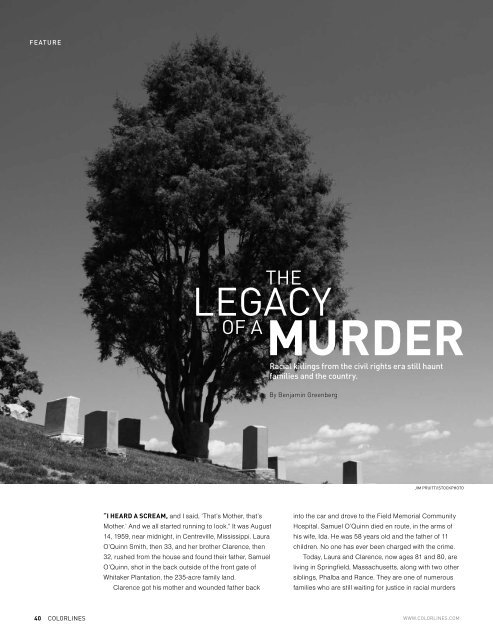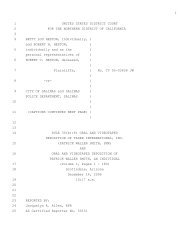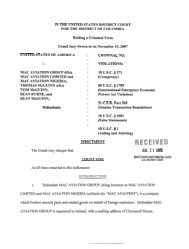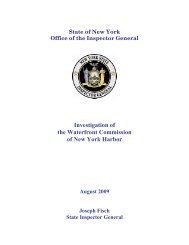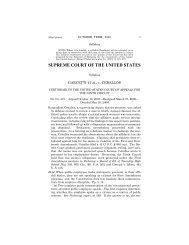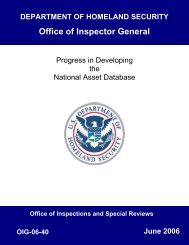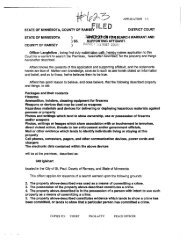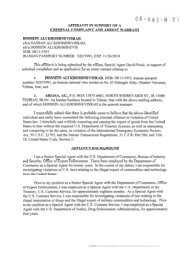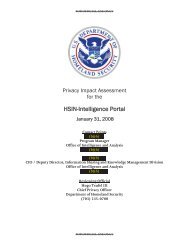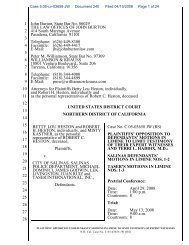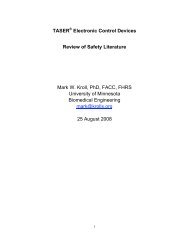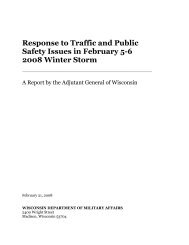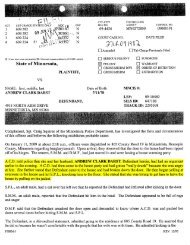The Legacy of a Murder - Hungry Blues
The Legacy of a Murder - Hungry Blues
The Legacy of a Murder - Hungry Blues
You also want an ePaper? Increase the reach of your titles
YUMPU automatically turns print PDFs into web optimized ePapers that Google loves.
and I said, ‘That’s Mother, that’s<br />
Mother.’ And we all started running to look.” It was August<br />
14, 1959, near midnight, in Centreville, Mississippi. Laura<br />
O’Quinn Smith, then 33, and her brother Clarence, then<br />
32, rushed from the house and found their father, Samuel<br />
O’Quinn, shot in the back outside <strong>of</strong> the front gate <strong>of</strong><br />
Whitaker Plantation, the 235-acre family land.<br />
Clarence got his mother and wounded father back<br />
into the car and drove to the Field Memorial Community<br />
Hospital. Samuel O’Quinn died en route, in the arms <strong>of</strong><br />
his wife, Ida. He was 58 years old and the father <strong>of</strong> 11<br />
children. No one has ever been charged with the crime.<br />
Today, Laura and Clarence, now ages 81 and 80, are<br />
living in Springfield, Massachusetts, along with two other<br />
siblings, Phalba and Rance. <strong>The</strong>y are one <strong>of</strong> numerous<br />
families who are still waiting for justice in racial murders
from the civil rights era. “It would give closure for us,” said<br />
Phalba O’Quinn Plummer, who is now 71. “It would really<br />
help a lot for all <strong>of</strong> us to know what happened.”<br />
<strong>The</strong> FBI is currently reviewing approximately<br />
100 cases that it may reopen; 84 <strong>of</strong> the victims have been<br />
named, and <strong>of</strong> those, 34 are from Mississippi. <strong>The</strong> true<br />
number <strong>of</strong> unresolved cases, however, is unknown. A review<br />
<strong>of</strong> a relatively narrow set <strong>of</strong> FBI and state documents<br />
found references to at least seven murders in Mississippi<br />
that are not on the published FBI list.<br />
Whitaker Plantation on Highway 33 in the late 1940s and<br />
farmed the land, raising and selling peppers, soy beans<br />
and cotton.<br />
On Sundays, O’Quinn went from one church to another<br />
selling burial policies, which a person could pay into and<br />
eventually meet the cost <strong>of</strong> his or her own burial. During<br />
these visits, he also organized benevolent associations,<br />
community groups that together paid into a fund for community<br />
members when they were in need.<br />
“It was kind <strong>of</strong> a self-help group,” explained Rance<br />
<br />
<br />
<strong>The</strong> lack <strong>of</strong> justice for Samuel O’Quinn and other<br />
Blacks murdered during the civil rights struggles <strong>of</strong> the<br />
1950s and ‘60s is the haunting background for current<br />
events that every so <strong>of</strong>ten lay bare the broken promises <strong>of</strong><br />
a supposedly post-civil rights society: the double standard<br />
<strong>of</strong> justice meted out to the Jena 6; the vast numbers <strong>of</strong><br />
people, overwhelmingly Black, treated as disposable<br />
during and after Hurricanes Katrina and Rita; the Klan-like<br />
torture and rape <strong>of</strong> Megan Williams.<br />
Last June, the U.S. House <strong>of</strong> Representatives passed<br />
the Emmett Till Unsolved Civil Rights Crime Act (known as<br />
the “Till Bill”), which would allocate $13.5 million annually<br />
for a special FBI <strong>of</strong>fice and Civil Rights Division unit to<br />
investigate civil rights-era crimes in coordination with<br />
local and state authorities. <strong>The</strong> Till Bill passed the House<br />
in June, but Senator Tom Coburn <strong>of</strong> Oklahoma placed a<br />
hold on the bill, keeping it stuck in the Senate through at<br />
least the winter recess.<br />
• • •<br />
<strong>The</strong> O’Quinns were a prosperous Black family in 1950’s<br />
Mississippi. A graduate <strong>of</strong> the Tuskegee Institute, Samuel<br />
O’Quinn was a certified plumber, electrician and carpenter.<br />
After working as the assistant town engineer and as the<br />
only plumber in Centreville, he opened O’Quinn’s Café with<br />
his wife, Ida, in 1937. He also owned and operated<br />
33 jukeboxes throughout southwest Mississippi.<br />
In the mid-1940s, O’Quinn obtained his mortician’s<br />
license and opened a funeral home. He sold the jukebox<br />
routes and invested in real estate. <strong>The</strong> O’Quinns owned<br />
most <strong>of</strong> the properties in the Quarters, which was lowincome<br />
housing for Blacks and essentially the ghetto <strong>of</strong><br />
the small rural town <strong>of</strong> 1,200 people. <strong>The</strong>y bought the<br />
O’Quinn, one <strong>of</strong> Samuel O’Quinn’s sons, now 70, “but they<br />
later grew, and every time you organize people, others get<br />
suspicious.”<br />
<strong>The</strong> O’Quinns were, in fact, as well-to-do as anyone in<br />
Centreville, Black or white. <strong>The</strong> 11 O’Quinn children never<br />
had to work for whites, which was most unusual and an<br />
affront to the white supremacist mentality <strong>of</strong> the time.<br />
On August 14, 1959, Samuel O’Quinn picked up his<br />
wife at their café, just <strong>of</strong>f Main Street, as he did every night<br />
at 11:00 pm. That night, their 7-year-old son, Roy, was with<br />
Ida at the café. On the ride home, Roy stood between his<br />
parents on the front seat. As usual, O’Quinn stopped, got<br />
out <strong>of</strong> the car to open their front gate and then drove the<br />
car in. He was shot when he got back out <strong>of</strong> the car to<br />
shut the gate.<br />
• • •<br />
O’Quinn’s children say their father became a target for<br />
murder because <strong>of</strong> rumors circulating about him. In 1957,<br />
O’Quinn had spent three weeks in Springfield, Massachusetts.<br />
<strong>The</strong> speculation in Centreville was that he had gone<br />
north to attend the NAACP convention.<br />
Within a week <strong>of</strong> O’Quinn’s murder, NAACP Mississippi<br />
Field Secretary Medgar Evers went to Centreville to<br />
investigate.<br />
Centreville is in southwest Mississippi, an area notorious<br />
even in Mississippi for violence and unusually heavy<br />
Ku Klux Klan activity. An NAACP memo relayed Evers’<br />
findings: “Mr. O’Quinn [was] not a member <strong>of</strong> the NAACP<br />
nor an advocator <strong>of</strong> its program. He was not even a<br />
registered voter and, therefore, his murder was not really<br />
connected with political activities. Rather, it is believed<br />
he was murdered by someone interested in obtaining
the valuable land which he owned on the highway [and]<br />
refused to sell despite numerous <strong>of</strong>fers from white<br />
purchasers.”<br />
It was all the more surprising then when, not long<br />
after Evers’s visit, a plain white envelope arrived at the<br />
O’Quinns. In it, the family found an NAACP membership<br />
card for O’Quinn. <strong>The</strong> O’Quinns, however, don’t believe<br />
that any whites could have known Samuel O’Quinn had<br />
joined the NAACP right before his death. “That’s the irony<br />
<strong>of</strong> the whole situation,” said Rance. “His NAACP activities<br />
were very secretive. We didn’t even know until afterwards<br />
that he was applying for membership.” His own wife did<br />
not know. But the rumors were there.<br />
“<strong>The</strong>re was no investigation,” Clarence O’Quinn said.<br />
“I didn’t even know the name <strong>of</strong> the Sheriff <strong>of</strong> Wilkinson<br />
County until you told me. No one <strong>of</strong>fered any expression<br />
<strong>of</strong> sympathy during our immediate bereavement,” he<br />
added. “I don’t think anything was done.”<br />
<strong>The</strong> only physical evidence that the O’Quinns recall<br />
was found were a couple <strong>of</strong> shells and a white glove,<br />
known to be a calling card <strong>of</strong> the White Citizens Council,<br />
at the spot where the gunman was thought to have stood.<br />
In the days following the murder, a six-paragraph UPI<br />
article mentioned a letter, found on the O’Quinn farm,<br />
<br />
saying, “Mr. Sam O’Quinn: You were too hard-headed.<br />
You wouldn’t listen to reason and have been nothing<br />
but a troublemaker for the NAACP.” News reports also<br />
mentioned an unnamed white businessman who came<br />
forward claiming to have received a letter threatening<br />
O’Quinn, “purportedly from a local Negro…sent because<br />
‘white people might be blamed.’”<br />
<strong>The</strong> O’Quinns actually now believe that a Black man<br />
murdered their father, but they suspect the killer was paid<br />
by whites to do the deed.<br />
Several years after the murder, a friend <strong>of</strong> Samuel<br />
O’Quinn’s started trying to contact Ida. <strong>The</strong> friend had<br />
cancer. He wanted Ida to come see him, but his condition<br />
worsened, and his children took him to Charity Hospital<br />
in New Orleans for treatment. One <strong>of</strong> the nurses there<br />
was from Centreville and knew the O’Quinns. She called<br />
Ida and said, “You should be down here. He’s on his<br />
deathbed. He’s saying that his finger on his right hand is<br />
the cause <strong>of</strong> Sam O’Quinn dying, that for $500 and a car,<br />
he killed his best friend.” <strong>The</strong> man died before Ida could<br />
decide to travel to New Orleans.<br />
• • •<br />
Four months after the murder <strong>of</strong> Samuel O’Quinn, Mississippi<br />
State Sovereignty Commission investigator<br />
Zack J. Van Landingham paid a visit to the Wilkinson<br />
County Sheriff, J.T. Falkenheimer. “<strong>The</strong> sheriff said that<br />
ever since the killing <strong>of</strong> the Negro Sam O’Quinn,” Van<br />
Landingham reported, “there has been no activity on the<br />
part <strong>of</strong> the NAACP or the Negroes in that community.”<br />
<strong>The</strong>se were the regular rounds <strong>of</strong> a Sovereignty<br />
Commission investigator. <strong>The</strong> commission was an<br />
agency established by the Mississippi State Legislature<br />
in 1956 to monitor and oppose civil rights activity. <strong>The</strong><br />
commission was disbanded in the 1970s, and its files<br />
were declassified in 1998 and are available online.<br />
<strong>The</strong> investigators went from town to town, gathering<br />
intelligence about civil rights activity from local <strong>of</strong>ficials,<br />
White Citizens Council members, paid informants and<br />
others. Investigators had specific people they inquired<br />
about. Whether or not the person in question actually was<br />
involved in the NAACP, if several city <strong>of</strong>ficials were asked<br />
about the activities <strong>of</strong> Samuel O’Quinn, the word got out<br />
that there was that suspicion.<br />
According to the 1959 news reports, Sheriff Falkenheimer<br />
led the investigation into Samuel O’Quinn’s<br />
murder. Now 84 years old, he still lives in Mississippi and<br />
says he doesn’t remember the murder or even Samuel<br />
O’Quinn’s name. “All that stuff is all behind me, and I’m<br />
looking forward to the future,” Falkenheimer said. He
could, however, be interviewed about his knowledge <strong>of</strong><br />
the case by the FBI if it is reopened.<br />
When the county’s current sheriff, Reginald Jackson,<br />
first took <strong>of</strong>fice in 1991, he was surprised to find that all<br />
previous sheriffs’ records were missing. <strong>The</strong> first Black<br />
sheriff in Wilkinson County, Jackson replaced Burnell<br />
McGraw, who had been sheriff since 1960. McGraw was<br />
a Klansman, according to a secret list <strong>of</strong> members in the<br />
files <strong>of</strong> former Mississippi Gov. Paul Johnson.<br />
“<strong>The</strong>y didn’t keep files here prior to 1970,” said District<br />
Attorney Ronnie Harper, and even with good evidence in<br />
hand, a modern-day investigation is out <strong>of</strong> the question for<br />
the D.A. “We have four lawyers and one investigator who<br />
does not have any law enforcement authority,” Harper said.<br />
“You really need something like the FBI involved; they’re the<br />
only ones who can dedicate <strong>of</strong>ficers to an investigation.”<br />
• • •<br />
In February 2006, the FBI and the Department <strong>of</strong><br />
Justice began to actively examine unsolved civil rightsera<br />
murders to consider which cases could still be<br />
prosecuted. Though it is usually up to the state to bring<br />
murder charges, the FBI can have an assisting role. If it<br />
finds sufficient evidence to prosecute, “the Department<br />
<strong>of</strong> Justice will approach local jurisdictions,” said Steven<br />
Kodak, an FBI spokesman.<br />
<strong>The</strong> FBI initiative began after Chip Burrus, former<br />
Assistant Director <strong>of</strong> the Criminal Investigative Division,<br />
received a letter in January 2006 about an old civil rights<br />
murder case. Burrus decided that if he was going to look<br />
at one such case, then he should see what else could<br />
be investigated. “It was the right thing to do,” he is <strong>of</strong>ten<br />
quoted as saying.<br />
“An FBI man came to see my mother when my father<br />
was killed,” Rance said. “She wanted to know why<br />
couldn’t the FBI get involved. He said the information<br />
from the sheriff was that the killer went back into the<br />
interior <strong>of</strong> Mississippi, which would put it in the state’s<br />
hands.” Centreville straddles Amite and Wilkinson Counties,<br />
which both border Louisiana to the south. If the gunman<br />
had fled across the state line, the FBI could more<br />
easily have gotten involved. A Freedom <strong>of</strong> Information Act<br />
request to the FBI, made by the Southern Poverty Law<br />
Center concerning Samuel O’Quinn’s case did not return<br />
any records.<br />
FBI spokesman Ernest J. Porter confirmed that<br />
Samuel O’Quinn is one <strong>of</strong> the cold cases the FBI is assessing.<br />
Porter could not <strong>of</strong>fer more information on the<br />
likelihood <strong>of</strong> a federal investigation. <strong>The</strong> Till Bill would<br />
provide a new infrastructure for federal involvement in<br />
state investigations <strong>of</strong> civil rights-era murders, but seeking<br />
state murder charges will still be left to state authorities<br />
unless the crime took place on federal land or involved<br />
kidnapping across state lines or other federal violations.<br />
Brenda Jones, the communications director for Rep.<br />
John Lewis, who introduced the Till Bill, said, “<strong>The</strong> purpose<br />
<strong>of</strong> the Till Bill is to engage federal resources to encourage<br />
work on the local level, but we cannot mandate<br />
local and state action; it would be seen as over-reaching<br />
and not a function <strong>of</strong> the federal government. <strong>The</strong> bill<br />
must also take into account people who are not interested<br />
in pursuing these cases and will object to disruptions in<br />
the separation <strong>of</strong> powers.”<br />
“If you leave it up to local people, it’s political,” said<br />
Richard Coleman, president <strong>of</strong> the Lauderdale County<br />
NAACP, “and that’s why a lot <strong>of</strong> the Mississippi cases<br />
haven’t been brought to justice.”<br />
Derrick Johnson, president <strong>of</strong> the Mississippi state<br />
chapter <strong>of</strong> the NAACP, concurs. Recently, the FBI’s hate<br />
crimes report showed Mississippi as the only state without<br />
any reporting <strong>of</strong> hate crimes. “<strong>The</strong>re are examples <strong>of</strong><br />
cross burnings in several communities across the state,”<br />
Johnson said, “but the law enforcement agencies and the<br />
D.A.s have refused to adequately and accurately report<br />
such hate crimes. With that type <strong>of</strong> focus, they have no<br />
real interest in pursuing civil rights-era cases without<br />
some kind <strong>of</strong> thrust or motivation coming from the state or<br />
federal government.”<br />
Recognizing these obstacles, the Mississippi NAACP<br />
has called on the state legislature to form its own special<br />
task force with powers to subpoena and indict. Johnson is<br />
not concerned about possible overlap between the state<br />
and federal cold case initiatives. “<strong>The</strong> more hands on<br />
deck, the better outcomes we can get in terms <strong>of</strong> solving<br />
these cases,” he said. ■<br />
Benjamin Greenberg is author <strong>of</strong> the blog hungryblues.net<br />
and a member <strong>of</strong> the Editorial Collective <strong>of</strong> Dollars & Sense<br />
magazine. Some information in his article was drawn from the<br />
Paul B. Johnson Family Papers, McCain Library & Archives,<br />
University <strong>of</strong> Southern Mississippi.


